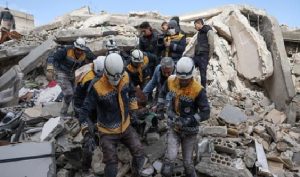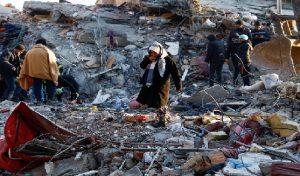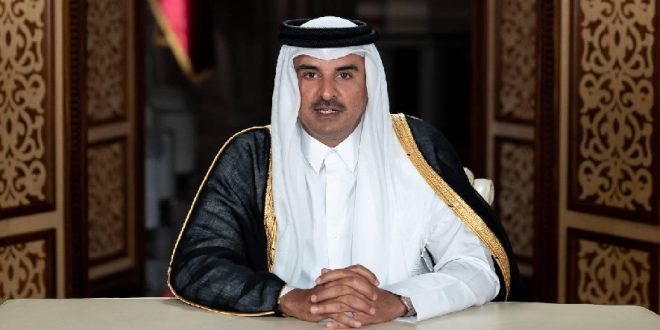06-03-2023
DOHA/ DAMASCUS: Qatar’s emir says he was puzzled by the delay in delivering aid to victims in Syria of last month’s earthquake, adding that it was wrong to abuse humanitarian aid for political purposes.
Qatar was among several regional states that backed rebels in Syria’s civil war, which has been going on since 2011, and has previously spoken out against efforts by some countries to normalize ties with Damascus.
 Speaking at the opening of the UN Least Developed Countries conference in Qatar’s capital Doha on Sunday, Sheikh Tamim bin Hamad al-Thani stressed the need to help Syrians “without hesitation” and support Turkey’s efforts to recover from the devastating earthquake.
Speaking at the opening of the UN Least Developed Countries conference in Qatar’s capital Doha on Sunday, Sheikh Tamim bin Hamad al-Thani stressed the need to help Syrians “without hesitation” and support Turkey’s efforts to recover from the devastating earthquake.
“Our meeting is taking place while our brothers in Turkey and Syria are still suffering from the impacts of the massive earthquake that struck them and affected millions,” Sheikh Tamim said.
“I stress the necessity of giving a helping hand without hesitation to the brotherly Syrian people. Exploiting a human tragedy for political purposes is unacceptable. There is no way through which we can build a new, safer, more just and more free world for today and tomorrow except through the path of international human solidarity.”
More than 45,000 people have died in Turkey while nearly 6,000 deaths have been reported in Syria where the northwest region controlled by rebels at war with President Bashar al-Assad was the worst hit.
The United Nations has called for access to be granted by all parties in Syria, already devastated by years of civil war, in order to scale up aid deliveries.
 Relief bodies complain of restrictions by the Damascus government that they say politicize aid distribution. Other aid agencies say hardline rebels have blocked aid deliveries from government-held parts of Syria, further complicating efforts.
Relief bodies complain of restrictions by the Damascus government that they say politicize aid distribution. Other aid agencies say hardline rebels have blocked aid deliveries from government-held parts of Syria, further complicating efforts.
Nearly 530,000 people have been evacuated from the disaster area in Turkey alone and the Turkish government said 173,000 buildings have so far been recorded as collapsed or severely damaged, with more than 1.9 million people taking refuge in temporary shelters or hotels and public facilities.
The UN estimates that 8.8 million people in Syria have been affected.
Last month, 22 deaths were reported from a cholera outbreak in northwestern Syria after the earthquakes hit the region, emergency responders in the opposition-held area said.
“The destruction of infrastructure, water and sewage lines after the earthquake increases the possibility of an outbreak of the disease,” the Syria Civil Defence, also known as the White Helmets, posted on Twitter.
 Abdel Moneim Hamdo rushed his two children, one a toddler, to a hospital in the northwest Syrian city of Idlib after they complained of severe stomach aches that did not seem to resolve.
Abdel Moneim Hamdo rushed his two children, one a toddler, to a hospital in the northwest Syrian city of Idlib after they complained of severe stomach aches that did not seem to resolve.
“I took my son and daughter to hospital to check whether they’d contracted cholera,” said Hamdo. He and his family including his eight children had moved from Atarib near Aleppo to the Al-Iman camp, close to Idlib, following the devastating earthquakes that struck the Turkey-Syria border region in February but “after doing some tests, it turned out they were suffering acute gastroenteritis as a result of consuming contaminated water,” he said.
Millions of Syrians were already displaced by more than 11 years of war, and the difficult living conditions at refugee camps in the area have worsened since the earthquakes. (Int’l Monitoring Desk)
 Pressmediaofindia
Pressmediaofindia




